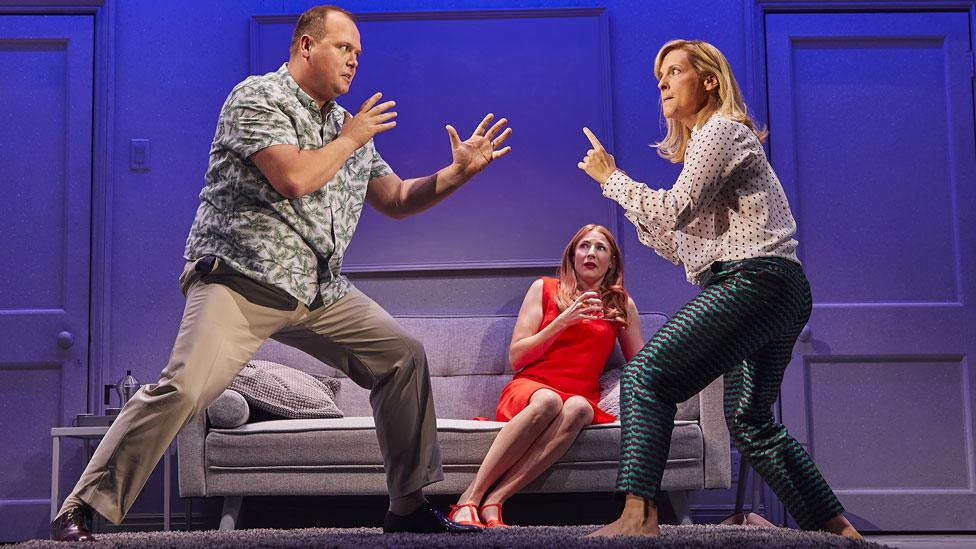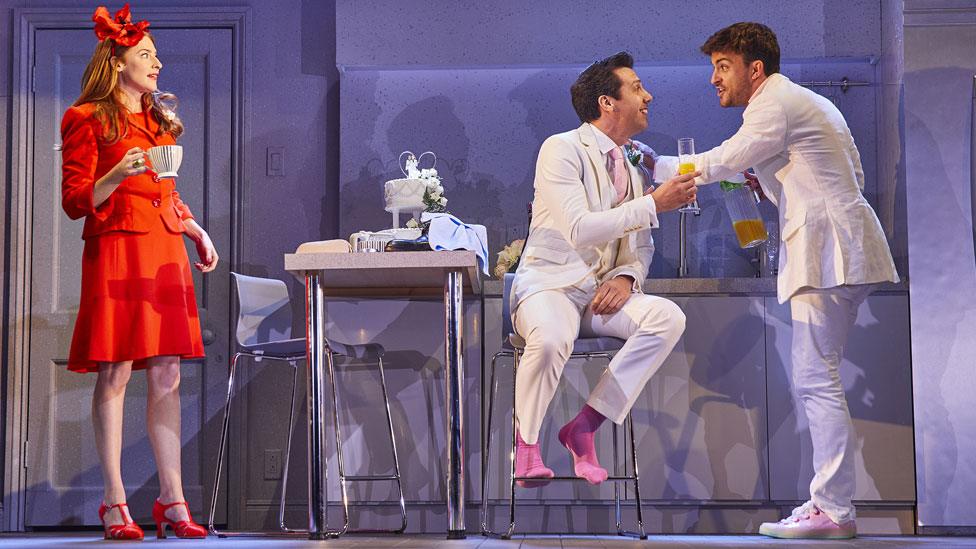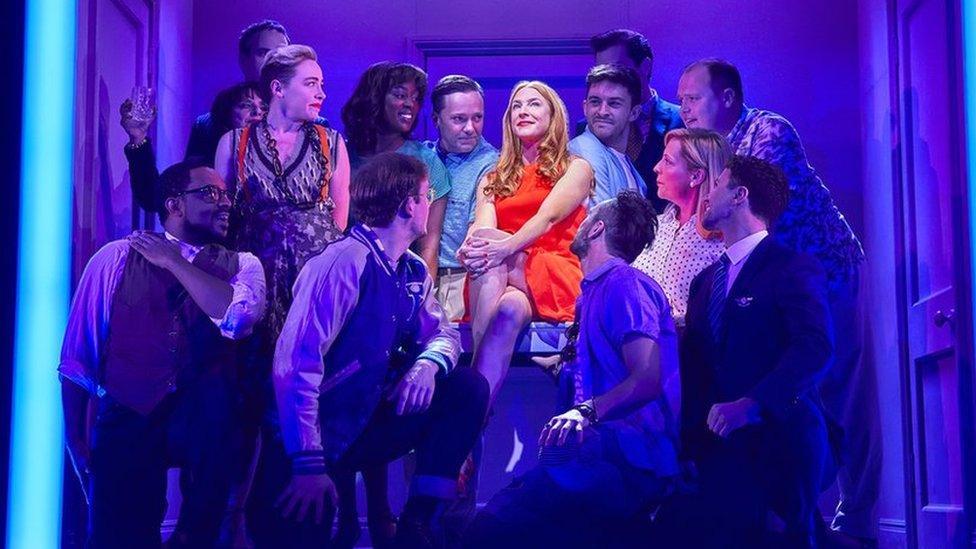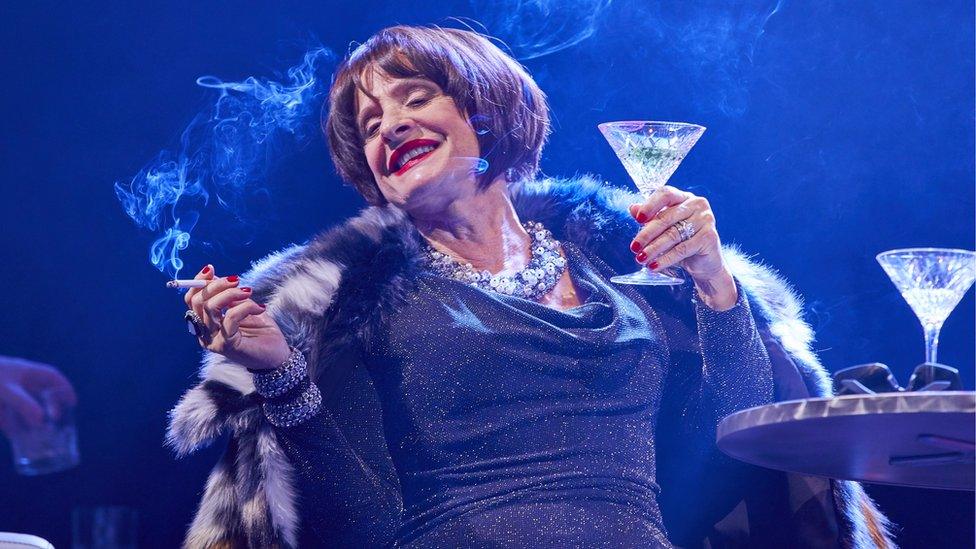Sondheim's Company is a gender-swap hit
- Published

Gavin Spokes, Rosalie Craig and Mel Giedroyc have plenty of action on stage
When Stephen Sondheim's musical Company opened on Broadway in 1970 it was a departure from tradition - there was no real plot and little sentiment. Forty-eight years on, director Marianne Elliott wanted to revive it in London - but knew parts of the show needed an update.
Elliott had the right credentials to steer a hit show. In quick succession she had created three stunning successes at the National Theatre in London: Angels in America, The Curious Incident of the Dog in the Night-Time and (directed jointly with Tom Morris) War Horse. She'd shown she could handle both the epic and the intimate.
Last year she opened a production company with business partner Chris Harper. One aim was to find plays with a female slant and identify female protagonists in new plays and revivals.
So it might appear odd to bring back an old show by 88 year-old Sondheim about a commitment-shy man in New York.
But Harper had an idea: why not gender-swap the lead male character Robert into female Bobbie and see where it gets us? It's made Company one of the most talked-about theatre events of the year.

Rosalie Craig now plays the lead, appearing with Alex Gaumond and Jonathan Bailey
Elliott thinks the story feels more convincing now it has a female lead character.
"That character was always attractive, sexually active, had a great career and a great apartment in Manhattan. We met Robert on his 35th birthday and he was still unmarried. But I think audiences now would think what does it matter if Robert doesn't settle down with someone else - what's the big deal?
"But if that character becomes a woman there are different issues. If a woman hasn't settled into some sort of relationship by the age of 35 she may be thinking the clock is ticking if she wants children. Clearly that's not for all women but Chris and I thought in 2018 it's a more dramatic situation. Audiences will care more because there's more at stake."
In 2013 in New York, Sondheim allowed the Roundabout Theatre Company to workshop a version in which the characters and relationships were gay. Ultimately he decided it didn't work and the concept went no further.

Centre stage: Rosalie Craig
So had Sondheim needed much persuasion to accept Elliott's new vision? "A couple of years ago we videotaped a simple version of it in London. We already had Rosalie Craig as Bobbie but other things hadn't yet all fallen into place. But Stephen watched it in New York and I was thrilled when he said go ahead," says Elliott.
The changes aren't limited to making Bobbie female. Elliott says the original script, by George Furth, cleverly used short scenes to introduce us to an array of characters in Manhattan. "But some of the social attitudes definitely felt old-fashioned: the women stayed at home and the men were the breadwinners. In two of the relationships we've swapped lines and the women now feel less subordinate."

Sondheim first allowed Company to be reworked with a gay storyline in 2013 by another theatre group but he didn't like the outcome
Five years ago Craig appeared in a production of Company in Sheffield. She played Marta, who has now re-emerged as male character PJ.
"I was one of the three girlfriends who of course now are my character's boyfriends. Robert had a one-night stand with a very attractive but dim flight attendant called April; she's now the very attractive but dim Andy (played by Richard Fleeshman). As soon as you make that male-female switch the whole dynamic alters.
"But overall we were amazed how easily the switch worked. In the lyrics there was the need to change a few pronouns of course. But Stephen Sondheim had to rewrite fewer lines than I think we expected."

What did the critics say?

Patti Lupone also stars in the show
Critics published their reviews of Company after the press night on Wednesday evening.
"A gender change can work wonders," wrote Michael Billington in The Guardian, external.
"While a male Robert can sometimes seem a cold fish, Craig invests Bobbie with a palpable warmth, curiosity and hunger for life."
Writing in The Stage, external, Tim Bano said: "Every modification makes sense.
"Pronouns are changed, as are a few lyrics, but these are small shifts. They have profound results, though: the show has become fundamentally different.
"It feels like it could have been written yesterday, rather than 48 years ago, and is contemporary right down to the Starbucks keep-cups that characters drink from."
The Evening Standard described it, external as "glorious" in its five-star review, while The Independent singled out Patti LuPone, external for her "stand-out performance".
But, Quentin Letts said in The Daily Mail, external, some moments were "perilously slow", adding it was "a show to admire rather than love".

Two years ago Broadchurch actor Jonathan Bailey also appeared in Elliott's workshop. But more recently Elliott began to question why Bobbie, living in New York, seemed to have no gay friends. So Bailey was offered a different role: diffident bride Amy became gay Jamie, freaking out just before his wedding to Paul. It's a highlight of the show.
With Alex Gaumond as his fiancé, Bailey squeezes every bit of show-stopping potential from his big song Not Getting Married. "It would be ludicrous if in 2018 there was no gay couple in Company.

Company is now colourful, fun entertainment
"It's only three years since same-sex marriage was legalised everywhere in America so Jamie and Paul are struggling with identity just like everyone else in the show. These are two men who know they're meant for one another but they can't quite say it.
"And obviously with Company now set in 2018, not back in 1970, you're going to explore the wealth of identity in today's queer culture, which is still developing. It's a really exciting time for me and Alex to perform this."
Gaumond thinks almost any of the couples in the play could have been made gay. "But the arrival of same-sex marriage means Jonny and I can play a real situation from contemporary life. So the change of sexuality isn't just a stunt - it really means something dramatically."
Bailey thinks the show works brilliantly as entertainment. But in its re-worked form he says it's become more meaningful.
Number of men increased
"Obviously what I want is that in 50 years' time people will still talk about our production and say, 'Oh my God why was it so significant?' And people will say it's from when gay marriage had just been legalised. And kids will say, 'You're kidding dad, you mean men couldn't marry men? That's ludicrous and I can't imagine that world.' That's what I hope."
It's a paradox that Elliott's careful changes have actually increased the number of men in the play. Of the cast of 14 there used to be eight women - now there are only five.
"But that's not the important thing," she says. "It's a female story with a female protagonist and it's absolutely totally through a female lens."
Company is on at London's Gielgud Theatre.

Follow us on Facebook, external, on Twitter @BBCNewsEnts, external, or on Instagram at bbcnewsents, external. If you have a story suggestion email entertainment.news@bbc.co.uk, external.